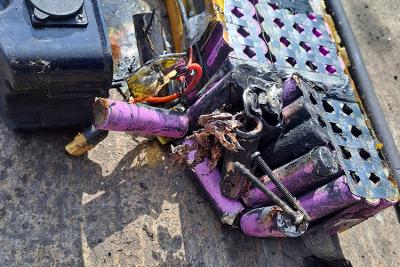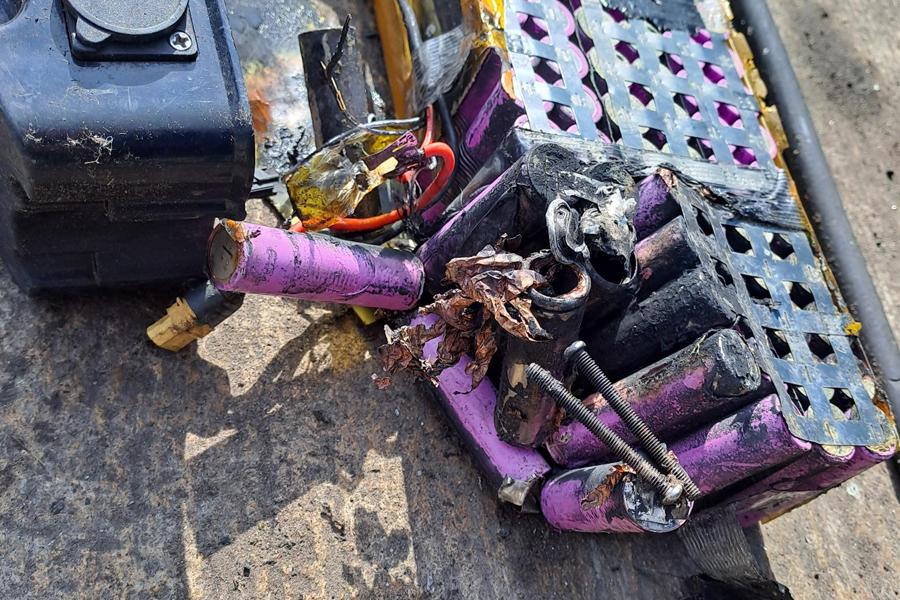Residents urged to keep batteries out of household bins

Residents across Gateshead are being urged to act responsibly and never place batteries or battery-operated devices in their household waste or recycling bins, following a recent fire suspected to have been caused by a damaged battery.
At the end of April, a blaze broke out at Campground Waste Transfer Station in Wrekenton, believed to have been started by a battery discarded incorrectly. The fire smouldered before igniting but was fortunately spotted early and extinguished before it spread. However, this incident highlights the very real danger these items can pose.
Batteries and electrical items containing batteries pose a significant fire risk when placed in general waste or mixed recycling. When damaged, crushed or punctured, as can easily happen during collection or processing, batteries can ignite fires that spread rapidly, putting lives, vehicles, and infrastructure at risk.
It's not just loose batteries that are a danger. Many small domestic appliances and everyday electronics have batteries that are difficult to remove, such as:
- Electronic cigarettes and vaping devices
- Mobile phones
- Laptops and tablets
- Power tools
- Electronic toys and solar powered items such as garden lights and decorations
Councillor Maria Hall, Chair of the South Tyne and Wear Waste Management Partnership, said:
"Batteries can ignite at any stage of the waste process, including on our refuse vehicles, or at waste or recycling facilities. Once alight, they burn incredibly fiercely and are difficult and dangerous to extinguish. Fires put lives at risk, including those of our hard-working waste collection teams, and can cause devastating damage to vital infrastructure.
"The solution is simple: never put batteries or battery-powered items in your household bins. Recycle them responsibly at designated points in places that sell new batteries, including supermarkets, DIY stores, local retailers, or your Household Waste Recycling Centre.
It doesn't matter whether it's a single-use AA battery or a sealed lithium-ion battery in a vape - all can cause fires."
What you can do
- Never dispose of batteries (loose or in devices) in your household waste or recycling bin.
- Recycle batteries and small electricals for free at:
- Supermarkets
- DIY stores
- Local shops (check if they operate a take-back scheme)
- Household Waste Recycling Centres (HWRCs)
- or any of the local drop-off sites listed on our website.
Why it matters
- Over half of all batteries still end up in the bin - increasing fire risk.
- Batteries are hazardous and contain toxic substances that harm the environment if they leak.
- Batteries also contain valuable materials that can be recovered and reused when recycled correctly.
Let's protect our communities, our facilities, and our planet - one battery at a time.

Residents across Gateshead are being urged to act responsibly and never place batteries or battery-operated devices in their household waste or recycling bins, following a recent fire suspected to have been caused by a damaged battery.
At the end of April, a blaze broke out at Campground Waste Transfer Station in Wrekenton, believed to have been started by a battery discarded incorrectly. The fire smouldered before igniting but was fortunately spotted early and extinguished before it spread. However, this incident highlights the very real danger these items can pose.
Batteries and electrical items containing batteries pose a significant fire risk when placed in general waste or mixed recycling. When damaged, crushed or punctured, as can easily happen during collection or processing, batteries can ignite fires that spread rapidly, putting lives, vehicles, and infrastructure at risk.
It's not just loose batteries that are a danger. Many small domestic appliances and everyday electronics have batteries that are difficult to remove, such as:
- Electronic cigarettes and vaping devices
- Mobile phones
- Laptops and tablets
- Power tools
- Electronic toys and solar powered items such as garden lights and decorations
Councillor Maria Hall, Chair of the South Tyne and Wear Waste Management Partnership, said:
"Batteries can ignite at any stage of the waste process, including on our refuse vehicles, or at waste or recycling facilities. Once alight, they burn incredibly fiercely and are difficult and dangerous to extinguish. Fires put lives at risk, including those of our hard-working waste collection teams, and can cause devastating damage to vital infrastructure.
"The solution is simple: never put batteries or battery-powered items in your household bins. Recycle them responsibly at designated points in places that sell new batteries, including supermarkets, DIY stores, local retailers, or your Household Waste Recycling Centre.
It doesn't matter whether it's a single-use AA battery or a sealed lithium-ion battery in a vape - all can cause fires."
What you can do
- Never dispose of batteries (loose or in devices) in your household waste or recycling bin.
- Recycle batteries and small electricals for free at:
- Supermarkets
- DIY stores
- Local shops (check if they operate a take-back scheme)
- Household Waste Recycling Centres (HWRCs)
- or any of the local drop-off sites listed on our website.
Why it matters
- Over half of all batteries still end up in the bin - increasing fire risk.
- Batteries are hazardous and contain toxic substances that harm the environment if they leak.
- Batteries also contain valuable materials that can be recovered and reused when recycled correctly.
Let's protect our communities, our facilities, and our planet - one battery at a time.
